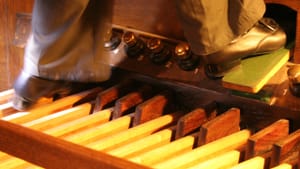Stay in the Loop
BSR publishes on a weekly schedule, with an email newsletter every Wednesday and Thursday morning. There’s no paywall, and subscribing is always free.
An American genius
Calvin Hampton: An appreciation

I was improvising at the organ a few weeks ago when I realized I was emulating Calvin Hampton, specifically his composition In Paradisum, which employs an eerie polytonality. This isn’t unusual. I’ve been accused of composing like Hampton before.
“I went to school with Calvin. He was a genius,” one of my teachers told me. “We didn’t even bother to be jealous of him, since he was head and shoulders above everyone else.”
Combining the incompatible
Hampton dared to take musical chances. While the results are uneven, his better compositions deserve a place in the repertoire. One of his greater successes was the establishment of a Fridays at Midnight organ recital series at his church in Gramercy Park during the ’70s and ’80s. His rock band, Sevenfold Gift, gave the earliest of these concerts. Adding to the unconventional approach, he’d use flashing lights with the music and invited audiences to lie down while they listened.
He was not afraid to combine two seemingly incompatible things. Apparently even his concert programming demonstrated this, with stylistic “right turns” that dashed many listeners’ expectations for a chronological program order. Instead of going from Baroque to Classical to Romantic, he paired pieces from disparate styles, using Bach as the centerpiece rather than the opener. In a sense, he was the inventor of the iPod shuffle manner of listening to music.
More than this, Hampton played organ transcriptions and advocated symphonic style organs at a time when such endeavors were considered passé. The mid-20th century saw the rebirth of the putative classical organ and historical performance practice, which are more suited to early music, but he wasn’t afraid to buck this trend. “He could just sit down and play a symphony from the full score. He had that kind of talent,” one friend of mine reports.
Saying what he had to
He was not merely a shock artist, though. Calvin Hampton broke molds because they couldn’t help him say what he had to say. His unique sense of melody, rhythm, and tonality, albeit not as distinct as Messiaen’s, makes his music instantly identifiable as his. Angular, disjunct melodies, sometimes playful, sometimes sweet, were one of his favorite toys, along with offbeat rhythms that grew out of “added” eighth notes — a device that many modern ears, accustomed to monotonous pop music, find annoying. Yet if there were an organist on Earth you’d see playing pop music, it would probably have been Calvin Hampton.
While Hampton was still alive, Erik Routley called him “the greatest living composer of hymn tunes,” and his biographer, Jonathan B. Hall, notes the rock influence on his hymn melodies de Tar and St. Helena. Not everyone loves his music, though. I once attended a concert at which There’s a Wideness in God’s Mercy, using the tune St. Helena, was sung. Although the building was filled with the musically inclined, the audience stumbled through the hymn, to many grumbles. But original minds like Hampton’s are not meant for ordinary audiences, and full acceptance often doesn’t come until the artist is safely dead.
Unfortunately, Calvin Hampton’s demise came all too quickly. He died 30 years ago, an early victim of the AIDS epidemic. In spite of his short life, he left a treasure of music behind him that goes far beyond the confines of organ and church music, one that can truly be called American.
I’m not at all ashamed to be accused of trying to imitate him.
Sign up for our newsletter
All of the week's new articles, all in one place. Sign up for the free weekly BSR newsletters, and don't miss a conversation.
